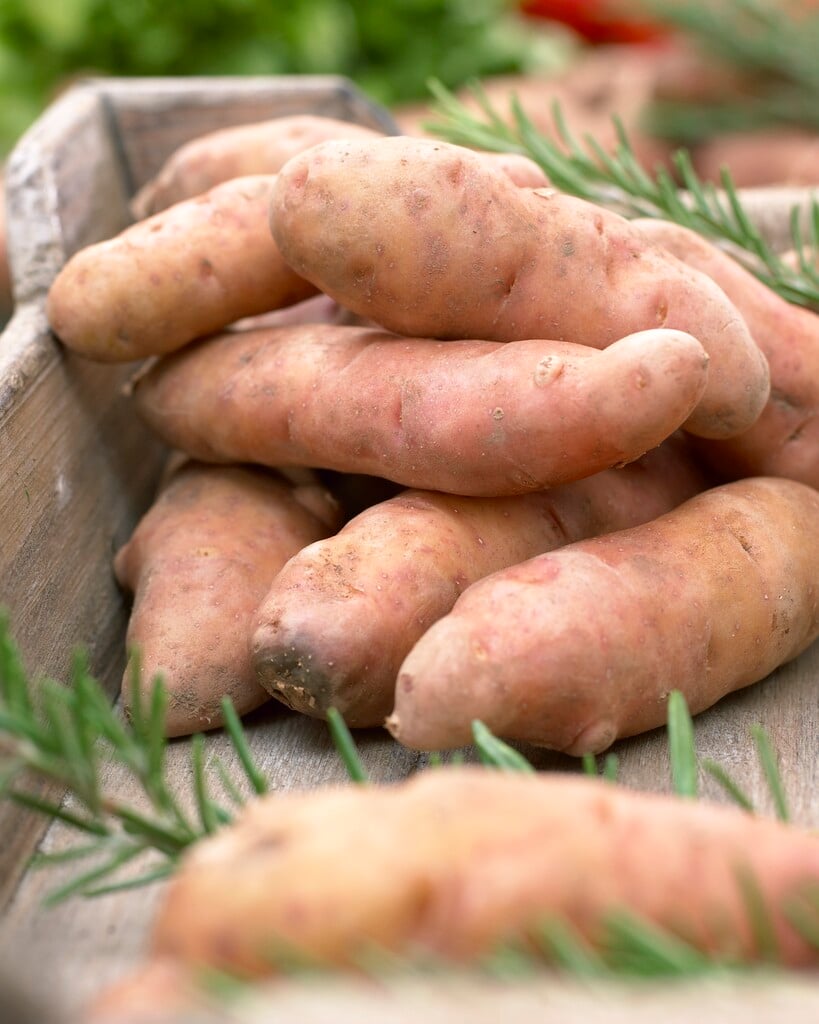Solanum tuberosum 'Pink Fir Apple'
potato (salad) 'Pink Fir Apple'
An old-fashioned late-cropping variety which are long and have thin, yellow, waxy and knobbly skins. Potatoes have a creamy, nutty flavour and can be harvested early to mid October. A good variety for boiling or chipping as well as for salads.

Buy this plant
Size
Ultimate height
0.5–1 metresTime to ultimate height
2–5 yearsUltimate spread
0.5–1 metresGrowing conditions
Moisture
Moist but well–drainedpH
Acid, Alkaline, NeutralColour & scent
| Stem | Flower | Foliage | Fruit | |
| Spring | White | Green | ||
|---|---|---|---|---|
| Summer | White | Green | ||
| Autumn | White | Green | ||
| Winter |
Position
- Full sun
- Partial shade
Aspect
South–facing or West–facing
Exposure
Sheltered Hardiness
H2Botanical details
- Family
- Solanaceae
- Native to GB / Ireland
- No
- Foliage
- Deciduous or Semi evergreen
- Habit
- Clump forming
- Potentially harmful
- Harmful if eaten, except potato crop. Wear gloves and other protective equipment when handling. Pets (dogs): Harmful if eaten, except potato crop - for further information and contact numbers regarding pets, see the HTA guide to potentially harmful plants
- Genus
Solanum can be annuals, perennials, evergreen or deciduous shrubs or twining climbers, with simple or pinnnately lobed leaves and star- or bowl-shaped, 5-lobed flowers with prominent stamens, followed by fleshy fruits
- Name status
Accepted
How to grow
Cultivation
Potatoes require an open, frost-free site with deep, fertile, moisture-retentive and crumbly soil for high quality and heavy yields. Improve soils by adding organic matter, such as well-rotted manure, in the autumn. Before planting, supplement with a general fertilizer, such as Growmore or blood, fish and bone, applied to the soil surface or spread along the sides of the drill during sowing, at the rate of 1kg per 10m (2.2lb per 33ft) row. Half of this amount will be enough if the garden is known to be fertile. Potatoes can also be grown in large containers or potato gro-bags. See Potatoes for further advice.
Propagation
Propagate from tubers known as 'seed potatoes' which are sprouted or 'chitted' prior to planting. Tubers can be chitted from January and planted between March and May, when the risk of frost has passed.
Suggested planting locations and garden types
- City and courtyard gardens
- Cottage and informal garden
- Patio and container plants
Pruning
No pruning required
Pests
May be susceptible to cutworms, slugs, wireworms, leaf and bud eelworm and potato cyst eelworm.
Diseases
May be susceptible to honey fungus (rarely), potato blight, potato scab, potato tuber rots and potato blackleg and stem canker.
Get involved
The RHS is the UK’s gardening charity, helping people and plants to grow - nurturing a healthier, happier world, one person and one plant at a time.